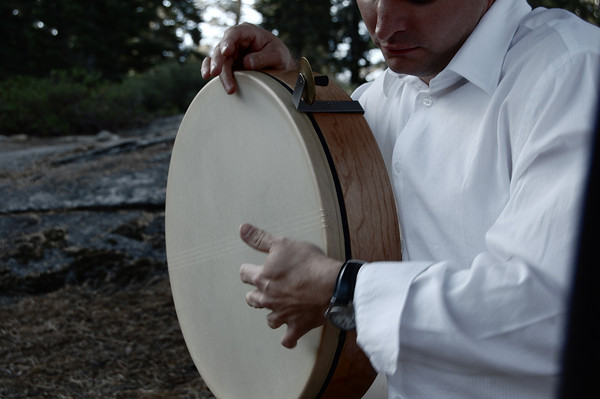I was recently contacted by a high school student to answer questions in an interview format for a paper he's writing. This student is fantastic and I'm doing everything in my power to "recruit" him to ASU. His questions for our email interview are great and I thought I'd share my answers. Personally, it's always a fruitful endeavor to reflect on the basics of what it is that makes me who I am.
Why percussion?
My grandfather was a drummer. Ever since I can remember, he'd show me how to drum on the weekends, and when I entered 3rd grade, he gave me a drum set. I joined the school band and orchestra in 4th grade and started lessons. Throughout 4th-10th grade, sports and music received equal attention, but in 11th grade, I became infatuated with the timpani playing of Rick Holmes, the timpanist of the Saint Louis Symphony Orchestra. This changed my life and from then on, I was hooked on classical music as well as playing the drum set. I had played in garage bands, jazz combos, the school bands, orchestras, community and honor orchestras from 7th grade until I graduated, so studying music seemed natural.
After years of studying the basics- drum set, snare drum, timpani, marimba, vibes, etc, I developed an interest in other aspects of drumming- West African, Middle Eastern frame drumming, Brazilian pandeiro, and the list goes on. It's at this point I realized percussion is endless and we will never know everything. It's the pursuit of knowledge and to always be better that drives me. Also, the ability to share music, both with audience members and students is energizing. Percussion lends itself well to doing this- be it teaching my university students or teaching beginners in the community- children and adult, it's something very special.
Here's a little about the timpanist from above:
Rick Holmes, SLSO
What’s the hardest part about your job?
There's nothing "hard"
about my job, but when first starting any endeavor, there are things
that are unfamiliar. I had a teacher in college who always said
"nothing is hard, it's only unfamiliar" and he was right. Think about
it- when learning a challenging section in your music that is a
struggle, once you get it down, it becomes your favorite part. "Hard"
is a label that creates cognitive dissonance. By using the term, "unfamiliar," once you get to know it, it's no longer a challenge!
Having said that, one of my biggest challenges is balancing teaching and performing- I feel both are incredibly important and support one another. To practice 4 hours a day today means spending less time prepping to teach, and vice versa. There's no magic formula, but I feel to be a great teacher, one must be a great performer, and to be a great performer, one must know how to teach.
Is percussion mostly talent, skill, or both?
I don't believe in
"talent." I believe people are prone to learn certain things more
quickly than others, but being born with a "gift" is meaningless unless
it's developed. In all cases, how diligently someone works is the
biggest indicator of musical success. And remember, not everyone learns
at the same speed. Others ignite later and become marvelous
percussionists- they just needed the right environment. Here's a pair
of books on the subject:
Talent is Overrated
The Talent Code
Pick them up from the library and give them a read. If they library doesn't own them, tell them to order them! In the mean time, I can mail you a copy.
What is your teaching style/method?
Great question. My teaching style, as a whole, is to teach not just the skills to be a great percussionist, but the skills to be great in any endeavor. Teaching students to teach themselves is my ultimate goal, and along the way, this develops not just a great percussionist, but a great person. Teaching self reflection, humility, focus, attention to detail, while encouraging passion, personality, and independence is the goal of every teaching moment.
To get more detailed- as a university teacher, I believe in an individualized curriculum to meet students where they are and progress them to meet their goals. Sure, there are certain standards and expectations of every student, but in general, I want to develop not just the finest "percussionist," but the finest "musician."
One of my stated philosophies for what Adams State will prepare a student for is this:
"When the phone rings and someone wants to hire you to play ____________, you can say yes." This was the philosophy of my teachers and I am eternally grateful for their approach.
Here's a blog post I wrote on the subject a few years ago:
"Because You Never Know"
I've had terrific teachers and mentors along the way and wouldn't trade my experiences for someone else's. In addition, I've learned much through trial and error, and thank my students for the lessons they continue to teach me.

